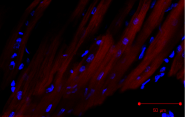With Lab-Grown Tissue, an Engineer May Prevent Unexpected Heart Problems

Just one month after being named a Scholar through the Yale Center for Clinical Investigation’s Clinical Translational Science Award program, assistant professor of biomedical engineering Stuart Campbell has been awarded an Exploratory/Developmental Research Grant from the National Institutes of Health. The combined $400,000 in research funding will enable Campbell to continue his development of novel lab-grown heart tissue specimens.
The concept grew out of Campbell’s focus on understanding the mechanisms that underlie genetic forms of heart disease. While DNA markers can sometimes be useful in determining which family members carry a genetic heart abnormality, in about half of all cases no definitive marker can be found. Instead, Campbell and his colleagues believe that the key to identifying at-risk patients may lie in using the patient’s own cells to grow a working heart tissue sample that can be observed for abnormal contraction patterns.
Campbell, in collaboration with staff in the Center for Engineering Innovation & Design, developed a system to produce scaffolding for heart cells that encourages them to form realistic cardiac tissue. His method results in easily manipulated samples that are ideal for lab observation and for the repeatability of diagnostic experiments.
NIH Exploratory/Development Research Grants encourage exploratory/developmental research by providing support for the early and conceptual stages of project development. Campbell’s proposal was supported by a strong interdisciplinary team that includes stem cell expert Yibing Qyang and cardiologist Daniel Jacoby, both faculty members in the Yale School of Medicine. The Clinical Translational Science Award program — also funded by the NIH — supports high quality translational and clinical research locally, and nationally, and fosters innovation in methods, training, and career development.

